Peter MALONE
Saturday, 18 September 2021 19:45
Bridge to Silence
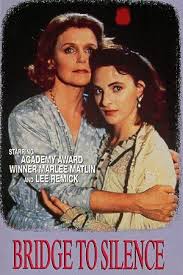
BRIDGE TO SILENCE
US, 1989, 92 minutes, Colour.
Marlee Matlin, Lee Remick, Josef Sommer, Michael O'Keefe.
Directed by Karen Arthur.
Bridge to Silence is an American telemovie, appealing to the widest audience and involving them emotionally with the characters and their crises. It is a star vehicle for deaf actress Marlee Matlin (Oscar-winner for Children of a Lesser God). She is a persuasive and powerful screen presence and in this film she actually speaks as well as signs. She is well matched by Lee Remick playing her mother, who never accepted her deafness, who wants to control and manage her daughter and her granddaughter's life. Michael O'Keefe has a good role as the sympathetic friend. Josef Sommer is also most genial as the heroine's father.
The film starts with an accident and tile heroine having to cope with her husband's death. Her mother interferes and takes charge of her child. She secludes herself but is gradually persuaded to come out and involve herself in the theatre for the deaf, especially a production of The Class Menagerie in which parallels are made between herself and Laura, the mother in the play and her own Mother.
There are many sad and emotional sequences, but there is also a strength in the writing and not everything is predictable. Moving.
1. A focus on the deaf, on relationships?
2. American telemovie style, the broad appeal, affluent characters, emotional crises, handicaps?
3. The plausibility of the plot, audiences identifying with the characters, the initial accident and grief, emotional crises, resolution?
4. The opening. with the accident, the relationship between John and Peggy, Lisa? Hospital, Dan tending John and being present when he died? Trying to keep him alive? Lisa unhurt? Peggy and her injuries and grief? Her reaction to John's death?
5. The portrait of Peggy: Marly Matlin's presence and style, as a woman, wife and mother? Deaf? her relationship with her parents? Fighting with her mother, the bitterness between the two? Her love for her daughter? The support of her friends? The mother deciding about her going home, taking Lisa? Her returning alone and closing herself in? Her mother's concern, visit, the clash between mother and daughter? Danny's coming, persuading her to venture out? Her playing Laura in The Glass Menagerie? Her visit to her daughter, her mother's protectiveness of Lisa? Her dreams and memories of John? Talking with Dan, the clash, his declaration of love and her violent reaction? Telling him that she saw him telling her of John's death? The rehearsal of the play, his angry outburst, mutual apology? The letter from her father, warning her about her mother's actions? Her father's continued love and support, always coining to the plays, to the opening night? The performance, the unicorn scene, the breaking of the
horn? The triumph of the play? Declaration of her friendship with Dan, love for her father and Lisa? Finding her mother, her mother telling her the truth about her illness, responsibility, blaming herself? The cape and the parallel with the play? Reconciliation? The portrait of Peggy?
6. Marge and her control, perfectionism, taking charge? Her relationship with her daughter, the clash? Love for her husband? Not learning how to sign? Freezing out Peggy's friends? Taking Lisa and possessing her, playing with her? Interrupting others when they were enjoying their company? Her fears, the clash with Peggy, her being hurt, going to the lawyers, the clash with AI, her grief? Looking over the photos? The decision to go to the play, her being overwhelmed, meeting her daughter, admitting the truth, breaking the horn of the unicorn and becoming normal again? Reconciliation?
7. Al and his goodness, support for his wife and daughter, quite presence, genial, handling the death and accident situation, always going to his daughter's plays, ringing Dan and his concern about the daughter, writing the letter and asking him to be present when she read it, at the play?
8. Dan and his friendship with John, the best man and godfather, at John's death, unable to keep him alive, telling Peggy? Continued support, directing the play, getting Peggy out of the house, telling of his love and his anger
with himself at his insensitivity, the rehearsal and his anger, the mutual apology, the performance of the play, the mutual friendship?
9. The background of the school and the theatre group, their friendship, coming to Peggy's support, the funeral, the play and performance?
10. Lisa and her love for her mother, speaking English but also signing to communicate with her? The effect of the accident? Separation from her mother, her grandmother caring for her and spoiling her? The illness and Marge's concern that there would be a repetition of the same situation? Reconciliation with her mother?
11. The death, the handicap, world of silence, signing and talking? Communication and the ‘happy birthday to Lisa’ meal? Self-image, relating? Audience insight and sympathy?
Published in Movie Reviews
Published in
Movie Reviews
Tagged under
Saturday, 18 September 2021 19:45
Brief Encounter / 1945
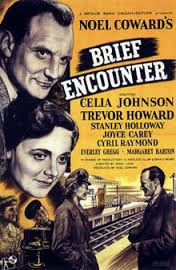
BRIEF ENCOUNTER
UK, 1945, 86 minutes, Black and White.
Celia Johnson, Trevor Howard, Stanley Holloway, Joyce Carey.
Directed by David Lean.
Brief Encounter was a very successful play by Noel Coward. Coward and director David Lean had collaborated on several film versions of Coward's plays, for instance This Happy Breed and Blithe Spirit. During the war they had worked together on In Which We Serve.
Brief Encounter was made just after the war. It is still an excellent film, somehow or other combining a very ordinary theme of a chance encounter and the beginnings of an affair with ordinary life in Britain after the war. There is a sureness and deft approach in the characterisation of the main characters and as portrayed by Celia Johnson and Trevor Howard; they are excellent.
The plausibility and reality of the situation is enhanced by the railway station setting and the excellent performances by Joyce Cary and Stanley Holloway as personnel at the station.
Music, pacing, photography are all superb and the film is very moving. It was remade by Alan Bridges in the 70's with Sophia Loren and Richard Burton in the central role. A lot of the technique of the voice overlap by the character of Laura was omitted from the second film.
However, Sophia Loren was excellent and moving in the role of Laura. Brief Encounter is a classic.
1. The quality of this film? Its reputation as a cinema masterpiece of post war Britain? Its insight, sensitivity, cinematic qualities?
2. British film-making in the 40s ? black and white photography, locations, studio work? Portrait of a family, of people and their ordinary lives, shopping, meals, going to the pictures, the streets of the city, the railway refreshment room, the countryside, a bridge and a stream? An atmosphere of authentic detail? The understated nature of the emotional conflicts, of love? The particular skills of Celia Johnson and Trevor Howard in the central roles? The quality of David Lean's direction?
3. The contribution of the musical score, the playing of Rachmaninoff's music by Eileen Joyce? The atmosphere of music, at the cinema, the band in the restaurant, the cellist, her work at the organ in the theatre?
4. Noel Coward's screenplay, insight, quality of observation of human manners and behaviour, the attention to detail? The psychology of the relationship between men and women, marriage, an affair? The significance of the title and its tone? The presentation of manners, small talk, the flow of conversation, the depth of communication?
5. Laura's confession, its framework for the structure of the film, the fact that it was addressed to her husband, the tone of a confession, self revelation, explaining and atoning, understanding her husband and his reactions, articulating her experience of Alec for her husband? The worries and anxieties throughout her confession? The return to the scene at home and her being distant? The build up of remorse, shame, fear, yet the deep experience of love and an important part of her life? The return to him at the end?
6. The importance of the structure: the railway station, the trains and their passing by, the trains as a symbol of brief encounters at the station? The focus on the railway refreshment room, the talk of Albert and the lady at the counter, her assistant? The introduction to the chatter and then noticing Alec and Laura in the background, Dolly and her arrival and chattering, the creating of tension and her misreading the situation, the train leaving, the departure, Laura and her going out (and the later realisation that suicide was close) the trip home and Dolly's chatter, feeling faint, the presentation of Fred, home and children and their settling down for the evening and the leading into her confession? The return to Fred in the middle, their bond at the end? The dramatic effects of flashbacks, of seeing the opening sequence at the end with all the tensions and the underlying meaning?
7. The film's presuppositions about marriage, mutual love, tenderness, the overwhelming nature of love, passion, the strange eruption of mutual love even for middle-aged people, the initiatives taken, the reality and ease of the beginning of an adulterous affair, feelings, the move towards consummation, sense of right and wrong, guilt, the relationship of thinking and feeling, the betrayal of trusts? How well did the film illustrate these themes? The stances of Laura, of Alec?
8. The subplot of the lady behind the counter and Albert, humour and a balance of moods, her way of talking, the soldiers and their insulting her, echoing the deeper themes of Laura and Alec?
9. The background of Fred and his home and career, the children, Laura as happily married and not realising any difference or possible different life? The fact that she never knew anything different? Her seeing Fred and the children in the light of her experience of Alec's departure? The talk of Alec's family and their going to Africa?
10. The build-up of the encounter into love - so natural, as Laura described it: the experience with the soot in her eye, the chance meeting, the chance encounters and reminding her of Alec, the importance of her comments trying to analyse when the affair began, what she should have done and not? The lunch and their being together, their joy together, laughter at the cellist in the orchestra, paying? Their going to the pictures? The importance of their not meeting and Alec's run to the station in the evening, Laura aware of her anxiety and wanting to see him? Subsequent outings, the comedy film with laughter at Donald Duck, flames of passion and going out? The beginning of Laura's lies and the telephone call to Mary? The irony of her being caught at the festive dinner with the champagne and Mary and her friend gossiping, the car ride and its being spoilt, the return to the flat, Laura's going to the train and her sudden getting off, more lies, especially about Miss Lewis? Her comments on sitting in the park and her smoking and Fred's disapproval, the station and the three hours passing thinking over things, the re-meeting of Alec? The build-up to the last day, her comment that only this morning he had gone, going to the bridge again, our seeing the final sequence with Dolly's arrival, hearing the situation and the words with a different viewpoint, Laura's suicidal feelings and the tilting of the camera to indicate this? How convincing the psychological development and presentation of the affair?
11. The background of the tender talk, the expression of the genuine love between the two, love and honesty, the details of the places they went, the meals, the pictures, the importance of Laura's fantasies in the train and the glamorising of her experience with Alec, the ways that they said goodbye and asking to help each other?
12. Comment on the background to the affair and the rhythm of moods and feelings and conscience; chance beginnings, slow development, peaking of the affair, the risks, the move to sordidness and shame, strain of relationship, their saying that it was the beginning of the end, the price to pay for the love, the taking of initiatives for breaking the affair, especially Alec's plans for Africa, the mutual forgiveness, the last time and the ending, his touch on her shoulder and leaving without looking back?
13. How well portrayed was the gallery of supporting characters, the talkers at the station, Laura's friends, the policeman, the people in the refreshment room, Steven and his encounter with Alec and catching Laura, his anger and disappointment, the return of the keys? The girl behind the bar and Laura's need for a brandy, the pad and the girl's insistence that it was closing time and Alec's arrival?
14. How well delineated were the characters of Laura and Alec, the strengths of characterisations of Celia Johnson and Trevor Howard, knowing them as people with their strengths and weaknesses?
15. How satisfying the resolution? The cathartic effect of Laura's confession, the fact that she had been a long way and Fred's thanking her for coming back to him?
16. A film of truth and insight, the quality of audience emotional response?
Published in Movie Reviews
Published in
Movie Reviews
Tagged under
Saturday, 18 September 2021 19:45
Brief Encounter / 1974
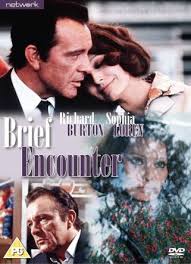
BRIEF ENCOUNTER
US, 1974, 99 minutes, Colour.
Richard Burton, Sophia Loren, Jack Hedley, Rosemary Leach, John Le Mesurier.
Directed by Alan Bridges.
Noel Coward's play became a classic David Lean film in 1946 with Celia Johnson and Trevor Howard. This updated version is well directed by Alan Bridges ("The Hireling") who has an eye for detail and local atmosphere. It boasts an excellent performance by Sophia Loren. This story of a chance meeting. its challenge to a marriage and to growing in love for a middle-aged couple has a lot of truth in it, truth which is movingly explored. The film is enhanced by Jack Hedley's performance as the .husband. Richard Burton is all right in the Trevor H6ward role.
1. The prestige of Noel Coward's plays, films? The impact of the original version? Audiences and critics tending to prejudge a remake? Set up expectations and comparisons? The quality of this film in itself?
2. The film keeping close to the original play? Adapting the original film to the 1970s? The impact on an audience who had not seen the original?
3. The quality of the updating? The atmosphere of realism and the use of Winchester locations? The style of the stars and their credibility? The portrait of a couple, their home life, work, moral stances, crisis? Colour photography? Musical score?
4. The significance of the title? The brevity of the affair? The significance of 'encounter' ? in comparison with 'affair'. adultery? The possibility of this encounter happening, the facts, credibility, Anna and Alec coping?
5. Themes of love: marriage, family? The story of Mrs. Gaines? The lady at the railway station counter? The range of marriage experiences, The aspects of fidelity? Complications in success and failures, fidelity?
6. The atmosphere of Winchester station and the detail of its management, the trains, expresses, local trains? Audiences invited into an atmosphere of realism? The encounter within this setting? Anna, the grit in her eye, the courtesy of the lady, Alec and his helping? The meeting in the park, Alec's visit to Anna's office? The visit to the morality plays? Tea together? The admission of their falling in love? The decisions that had to be made? Anna and her changing her work day? What she told her husband? The outings and the passing of the accident? The discussion about the affair and what should be done? The impact of Anna's missing Mrs. Gaines? The evening at the flat and its fiasco with Anna having to run? The scene at the railway station afterwards? The walk in the country and the irrevocability of decision? The dramatic impact of the final chatter and Alec and Anna parting with the lady friend oblivious? The development of the affair: accident, innocent meetings, decisions, needs, pressures, favours? The reality of such an affair and its ending?
7. Sophia Loren's portrait of Anna? The background of her story, an Italian in England? Husband and children? At home and her view of her husband and children and their life style? Her work, regularity, visits to the station? Her response to Graeme and her comment on his lack of emotion? Their discussions at home, taking one another for granted? Home tasks? The importance of the interviews with Mrs. Gaines and her reliance on Anna? The importance of fidelity? The discussions about being analytical? The encounters with Alec and her changing? Experiencing needs, joy, guilt? The cover ups? The friend meeting them at the play and ringing? Changing her work days? Her announcement that she was home when she arrived? The reaction of her children? Their fights and her having to adjust to home life? Mrs. Gaines and her suicide attempt? The visit to the hospital? Her working with Grace at the office? Her experience of the flat and Alec being unfair? Her decision to go? Hurrying away and her humiliation? The dramatic impact of the walk in the country? Her anguish while her friend chatted at the railway station? Her return home and her husband accepting her? Audiences' identification with the character? As portrayed by Sophia Loren with her style? Her strengths, weaknesses? A realistic character?
8. Alec and his presence at the station, helping Anna with the grit? The attraction. the meeting at the park for lunch? visit to the office and the pressure on her? His taking her to the plays ? and the ironic themes of the plays? His asking her to be in an affair. the pressure? His own life story ? and Anna's comment on his looking like a little boy, his face? The accident and his assistance? The outings? The plans for Australian and decisions to be made? The glimpse of him at home ? the discussion with his wife about the definition of love? Intellectual, unfeeling? His decision about the flat? The humiliation? His explanation to Stephen ? Stephen's cynical rejection of his explanation? Taking Anna's coat? The encounter at the railway station? His final pleading with her? The statement that time and the future would change the quality and intensity of the affair? The strain of the final goodbye? The chatter, the trains going in opposite directions?
9. Graeme, the English husband, quiet, unemotional, doing puzzles, enjoying toys, playing with the boys? Ordinary warmth? The story of his temptation to infidelity and its impact on Anna? The way that he related with the boys? His accepting Anna on her return and her having been a long way away? The household, the au pair girl?
10. Melanie and her lack of love for her husband? A brittle home life? Her book reviews and career? Definitions of love?
11. The portrait of Mrs. Gaines ? her tentative visit, her story, covering up for her husband? Love and fidelity? Children? Poverty and need? Her relying on Anna? Her disappointment when she was not there? Her suicide attempt? Anna's visit to the hospital? Her being alright until the next time? The comparison of Anna with Mrs. Gaines and her marriage?
12. The people at the railway station, the lady at the counter and her family? The teacher with the children etc.?
13. Stephen and his friendship with Alec, the hurt as regards the use of the flat, his sniggering at the effect on Alec?
14. Seeing the encounter through Anna's eyes and judging with her? The importance of chance encounters, commitment and fidelity, guilt ? and the message of John the Baptist at the play? The Indication of suicide when Anna stood near the express hurtling through the station? Love and death?
15. Noel Coward's insights into human experience of love, pain, fidelity, courage?
Published in Movie Reviews
Published in
Movie Reviews
Tagged under
Saturday, 18 September 2021 19:45
Bring Me the Head of Alfredo Garcia
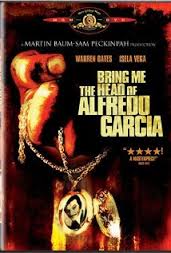
BRING ME THE HEAD OF ALFREDO GARCIA
US, 1974, 112 minutes, Colour.
Warren Oates, Isela Vega, Gig Young, Robert Webber, Helmut Dantine, Kris Kristofferson.
Directed by Sam Peckinpah.
Bring Me the Head of Alfredo Garcia is a Sam Peckinpah film. In many ways, during the seventies Peckinpah's films moved away from popular tastes. The Wild Bunch, Straw Dogs, The Getaway were for large audiences. But other films like Pat Garrett and Billy the Kid, The Killer Elite were for smaller audiences. Cross of Iron (1977) was an attempt to appeal to wide audience as well as to those interested in Peckinpah films. This one is a specialist exploration of a world of brutality, lust for money and power and arbitrary death. Indeed it is excellent Peckinpah, very well constructed and photographed. It takes leisurely time in building up strong characterisation of its "hero", Ben (Warren Oates) and his relationship to Elita, his ruthless clutching at a chance of escaping from a seedy existence and his relentless taking on a world of power and violence. There is a wealth of theme, detail and power in a film of very limited popular appeal.
1. How would this film best be described? Thriller? Black ironic comment on the twentieth century?
2. The contribution of the colour. light and darkness, Mexican country backgrounds, the contrast with the Mexican cities, America? The music of the commentary, songs? How well did the film create atmosphere, sustain it, have the atmosphere influence the themes and their communication?
3. The significance and emphasis of the title? As spoken, to whom, motivations? The literal interpretation? The indication of themes?
4. The style of the director, Sam Peckinpah? The initial tableau? The portraits of society? The presentation of a hero, non-hero? A world of crime, violence, these as a basis and governing force for a society?
5. The light and darkness of the opening? Mexico and its moral and religious background: sexuality, honour, violence, vengeance? The young girl moving from light to darkness and inquisition? What kind of world was this? A world of torture? Blackness in the name of religion?
6. The contrast with the bought men: Quill and Sappensly? What kind of men were they, their individual characteristics, their capacity for violence, their greed, their lying and treachery? As representatives of modern men? Their relationship with Benny? Their greed and their saving him? Their treachery and their deaths? Comment on these two men as modern criminals?
7. The contrast with Benny as hero? What kind of man was he? Strengths and weaknesses of character, a greedy man, a weak man, a loser? His acceptance of the commission and his motivation for it? His involvement with the people concerned? How much of a loser was he? was he born to be destroyed? His ordinariness, his violence and tenderness? His relationship with Elita? And the parallel with Alfredo Garcia and his relationship to Elita? Comment on the lyrical aspects of his relationship with Elita, the tenderness, the prettiness? The contrast with the darkness, the violence, rape and murder? An atmosphere of killing? Where was Benny most at home? His involvement in his task, his investigations, the reliance on Elita? The encounter with the bikies and the killing and confrontation? The ambush and its ugliness? The importance of his burial with the corpse and with Elita? How did he become a victor with the head of Alfredo Garcia? His becoming a victim by the men in pursuit of Alfredo Garcia and the money? His status and stance when he finally confronts the authorities with the head? His almost rejection of the money and its significance? The utter futility and inevitability of his death? Its violence? How well did Benny represent modern futile man?
8. The visual portrayal of the head, its literal emphasis, in the bag, the car seat, the flies and the heat, the ice? Audience response to this? What was the head a symbol of? Power and authority, vengeance, achievement. violence, etc.?
9. The character of Elita as a woman, as a whore? Her relationship with Alfredo Garcia? Her relationship with Benny, the songs and the tenderness? The contrast with the atmosphere of fear during the journey? The intrusion of the bikies. the rape and her provocation? The fact that Benny was her saviour? The violence of her death and burial? A symbolic woman? The contrast with Theresa and her relationship with Alfredo Garcia. Theresa's violence and her wanting her father killed?
10. The film's portrayal of the big city syndicates, the types involved there, the impersonal and businesslike violence?
11. The portrayal of the Jefe? His authority in Mexico. his role over his family, his ambiguous violence and tenderness? Theresa's attitude towards him? His death?
12. The impact of Benny's death? Its motivation? Purpose?
13. The thematic vision of Peckinpah in portraying this black story? How entertaining? How significant? The ironies?
14. The purpose of the whole plot. a sense of mission, gaining meaning for life in accomplishing a mission. in relationships? The need for goals?
15. This story as portrayed in the landscapes of country and city?
16. Comment on the attention to detail of the landscapes: the Mexican house. its visual presentation, the rocks and the desert, the village with the fairground and the brass band and the child's funeral, the graveyards with the cactus, the church and the ancient aspects of religion, and the skyscrapers of the cities? How symbolic?
17. How valuable is this kind of film for exploring the modern world?
Published in Movie Reviews
Published in
Movie Reviews
Tagged under
Saturday, 18 September 2021 19:45
Brinks: The Great Robbery
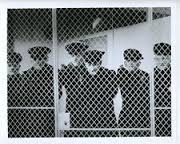
BRINKS: THE GREAT ROBBERY
US, 1979, 96 minutes, Colour.
Carl Betz, Darren Mc Gavin, Cliff Gorman, Michael Gazzo, Stephen Collins, Leslie Nielsen.
Directed by Marvin Chomsky.
Brinks: The Great Robbery is an interesting, rather than entertaining, telemovie. It was directed by Marvin Chomsky, director of many miniseries including Roots, telemovies like Victory at Entebbe and movies like Tank. The film has an interesting cast ranging from Darren Mc Gavin and Cliff Gorman as the masterminds of the Brinks robbery with Michael Gazzo as a Mafia criminal and Stephen Collins (later to become more famous in films and television) as a member of the F.B.I. squad investigating the crime.
The Brinks robbery was considered the crime of the century. It consisted of a hold-up of the Boston Brinks Company in 1950. The film re-stages the planning of the robbery, its execution and the subsequent history of the main protagonists. They resisted the investigation of the F.B.I. for several years, some enjoying the fruits of the robbery, others collapsing physically and mentally. The F.B.I. persevered, eventually getting people to testify against one another and the crime was solved.
The strength of the film is in the quick character-sketching, the highlighting of motives for such ordinary men to rob Brinks. The details of the execution of the crime are of interest.
In 1978 there was a cinema version of the robbery with an all star cast led by Peter Falk and Paul Sorvino. Direction of this film, The Brinks Job, was by Oscar-winner William Friedkin, director of such films as The French Connection and The Exorcist. This telemovie remains a more sober and straightforward account of the robbery.
Published in Movie Reviews
Published in
Movie Reviews
Tagged under
Saturday, 18 September 2021 19:45
British Agent
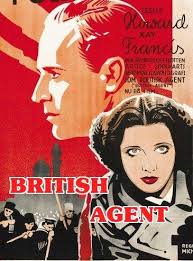
BRITISH AGENT
US, 1934, 81 minutes, Black and white.
Leslie Howard, Kay Francis, William Gargan, Irving Pichel, Philip Reed, Walter Byron, J. Carroll Naish, Halliwell Roberts.
Directed by Michael Curtiz.
British Agent is a short-running espionage thriller. It is of interest as a Michael Curtiz film before he moved into the larger-budget action spectacles for which he was famous at Warner Brothers. It is also a star vehicle for Leslie Howard who, at the same time, was making such spectacular films as The Scarlet Pimpernel and The Petrified Forest. His leading lady is Kay Francis. There is interesting support from actor-director Irving Pichel and J. Carroll Naish.
The film is of historical interest as a thriller of the '30s but, more particularly, as a fictionalised account of the memoirs of a British diplomat, Bruce Lockhart. The story is set at the time of the Russian Revolution and, in studios, re-creates Revolutionary Russia. (The film pales somewhat in comparison with such films as Von Sternberg's 1928 The Last Command.) Of interest also are the portraits of Stalin (Pichel), Trotsky (J. Carroll Naish) and of Lenin himself.
The film is moderately exciting but might have been much better. Of historical interest.
Published in Movie Reviews
Published in
Movie Reviews
Tagged under
Saturday, 18 September 2021 19:45
Broadway Danny Rose
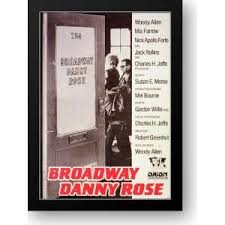
BROADWAY DANNY ROSE
US, 1984, 85 minutes, Black and white.
Woody Allen, Mia Farrow, Nick Apollo Forte, Milton Berle.
Directed by Woody Allen.
Broadway Danny Rose is a gentle comedy. It came immediately after Allen's Midsummer Night's Sex Comedy and Zelig. once again, with his usual director of photography and designers, he has made a black and white New York comedy. This is the world of Broadway and theatrical agents, comics, cafes. In fact, the film is presented as an anecdote, reminiscences by the chatting comics. This gives an excellent context for the story as well as enabling the characters to be quickly delineated and the action to move ahead.
Allen is Danny Rose, a longtime agent who is a friend of the eccentrics. He believes in them, they rely on him, he helps them to success and then they leave him. This happens throughout the film, with a double cross and with Mafia gangsters chasing, with an Italian singer portrayed by Nick Apollo Forte. Nostalgia is back and the '50s singer makes a comeback, with the help of Milton Berle. He also makes his comeback with the help of a blonde floozy, portrayed by Mia Farrow (almost unrecognisable for most of the film). There is humour, there is much verbal wit and wisdom, Allen plays a character full of pathos. There are also some laughs in the vein of Allen's pre-Stardust Memories comedies.
1. The popularity of Woody Allen? An American comic? New York comic? His verbal and visual humour? The background of nightclubs and cabaret, storytelling? His persona: the little man, the gentleman, put-upon? Pathos? Allen's powers of observation and critique? Insight into human nature?
2. His love of New York and the use of the city? Black and white photography, the various locations, Broadway itself, streets and cafes? The vistas e.g. the bridges? Sequences outside New York? The comment and effectiveness of black and white photography?
3. The importance of the musical score, the Italian songs, the nostalgia for the '50s songs, the spirit of Italian musical comedy? The overtones of Charlie Chaplin's music, the music of Nino Rota for Fellini films?
4. The influence of the Damon Runyon stories? Echoes of the stories and characters, homage? Gangsters, girls, show business types, eccentrics of the street? Tough and gentle? Helping others, betraying others? Humour, language, situations?
5. The comics and their meeting together, telling obvious jokes, discussing audiences? The reality of the comics sitting around yarning about their past? Their anecdotes ? real or not, legends, oral tradition? The nature of the jokes, the cafes, cabaret? The good spirited humour? The audience invited into this conversation? The anecdote, the use of time, quick delineation of characters, flashbacks? The interplay of verbal and visual humour? The voiceover commentary?
6. Danny Rose's character in context, New York, show business, the nature of his acts, his work as an agent? The passing of the years? The young Danny Rose and his gestures, spiels? The glasses player, the blind act, the lame, the birds, the balloon folders? The initial anecdotes with their humour for a key to the story about Lou?
7. Audience expectations, reactions, sharing the reaction of the chorus of comics? The blend of happiness and sadness? The pathos of the ending, the genuine warmth? The final comments behind the credits? Going home after hearing the yarns?
8. Danny as the object of the stories, well-liked, revered? Woody Allen and his appearance. size. balding. glasses? His wistful looks? His verbal humour. wisecracks, metaphorical incongruities? The lingo of the agent - Darling, fantastic, God bless you, star signs etc.? A pleasant man and his care for the down-and-outers? The echoes of Chaplin? The pathos of the little man, place in society, hard done by, not winning?
9. Lou and the big man, his bad singing, the background song during the credits, the echoes of the '50s into the '80s, nostalgia? The close-ups of the women responding to his songs? Danny's care for him, devotion? Lou's age, going to fat, drinking? His planning behind Danny's back? Yet Danny giving him time (and others criticising e.g. the man with the dead bird), Danny's frenetic talk. helping him to get jobs, discussions with Milton Berle, the TV show? Entertaining on cruises (and the send up of television interviews where Lou talks about the rebirth of his career)? The final set up, hopes? Danny pandering to Lou, soft-talking him, getting him sober? The insight when Danny visits Lou's wife and kids for the meal?
10. Tina and Lou's stories about her, devotion to her. his anguish and wanting her present at the show? Sending Danny. Danny's awkward arrival Tina's tantrum, the pleading, the cajoling? The visit to the fortune teller? Danny chasing her. the cup of coffee and talk, the drive and the talk. getting to know Tina and her background and offhand remarks about her husband's death etc.? The world of Italian gangsters? Danny as the centre of attention, the family commenting on him. thinking that he sent Tina the white roses, Johnny and his melodramatic accusation of Danny? The mother and her wanting revenge on Danny? Danny and Tina with their Perils of Pauline adventures. the car and its being bashed, running through the fields, the reeds, coming suddenly across the surreal world of the from-outer-space man for the commercial? The huge warehouse with the parade masks etc., their being tied together, the humour of the wriggling and escaping? Tina's later memory of the parade? Finally arriving in time for the show? Tina and the bond with Danny. her betrayal of him, wanting to get out of the argument? The not-quite-so-dumb blonde? Mia Farrow's portrayal of Tina?
11. Tina's betrayal. the flashback memory with the new agent. her luring Danny, using him? Bowing out? Taking Lou from his wife? Travels with Lou and her unhappiness? Going back to the fortune-teller? The date with the commercials star? The parade and her memories? Her going back to Danny?
12. Lou and his self-centredness. using Danny. betraying him? The success of the show? Turning on Danny and walking out? His subsequent career? The failure of his relationship with Tina?
13. Tina and her change? The previous discussion with Danny about guilt, even guilty about not believing in God? The fortune-teller being away for the weekend, the parade and its memories, her decision to visit Danny? The Thanksgiving dinner? Her going away and Danny chasing her?
14. The scenes of Danny's humanity - with the strange acts and encouraging them? Danny and the visit to the hospital with the comic being bashed? The Thanksgiving dinner for his friends? His refusal to forgive Tina? His change of heart and following her?
15. The humour and reality of the fortunetelling sequence. the crowds going, her visions from the bed etc.? Her being away for the weekend?
16. Italian families, Mafia connections, wealth, vengeance and vendetta, thuggery?
17. Teresa and her family, devotion to Lou and his walking out?
18. The cutthroat world of show business, agents? Milton Berle's guest appearance?
19. The insight into human nature - good, kind, used, foibles, happy, hurt?
20. Woody Allen and his experience of middle age, nostalgia, wisdom, skill at comic observation of human nature?
Published in Movie Reviews
Published in
Movie Reviews
Tagged under
Saturday, 18 September 2021 19:45
Broken Arrow / 1950
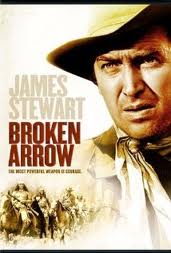
BROKEN ARROW
US, 1950, 92 minutes, Colour.
James Stewart, Jeff Chandler, Debra Paget, Basil Ruysdael, Will Geer. Arthur Hunnicutt, Jay Silverheels.
Directed by Delmer Daves.
Broken Arrow is a classic western. It was considered to be the first western which presented the Indians in equality with white Americans. Some of the dialogue is still quite strong in its affirmation of the dignity of the Indian and his way of life. James Stewart was an excellent choice for the central character, a typical strong American of integrity who could make a bridge between white men and red men. Stewart is very much at home in the central role. Jeff Chandler sparked his successful but short career with a strong performance as Cochise (later to reprise it in the minor western Battle At Apache Pass. Debra Paget was at the beginning of her career as the Indian heroine. There is fine use of location photography, a blend of action, Indian customs and reflection on the wars with the Indians. There is tragedy as well as a hope for equality in the United States.
Direction is by Delmer Daves, a writer director who was working with thrillers at this time, moved into action adventures and was to make a number of very successful westerns including Jubal, 3.10 From Yuma, Cowboy. In the '60s he made a number of soap operas like A Summer Place, Susan Slade, Parrish. Broken Arrow led to a television series in the '50s, and to many films urging tolerance for Native American Indians.
1. A good western? Western themes, characters? An Indian western? Its insights into racism and race relationships?
2. The impact of the film in 1950? A classic western? Its taking up the cause of Indian rights? Its influence on film portraying Indians in the 1950s especially? Does the film now seem dated, especially in view of subsequent westerns?
3. Conventions of the western - location photography, Arizona, the open spaces, the towns, travelling? The battles between whites and Indians? The Indian western score?
4. The choice of the stars: James Stewart as the typical American? His persuasiveness in this dramatic as well as moralising role? Jeff Chandler and his interpretation of Cochise?
5. The device of Tom Jeffords' narrative? Authentic yet solemn? Personal yet moralising? Hopeful? James Stewart's speaking style, telling of the events, his feelings, the background, the repercussions? A persuasive device for the points being made?
6. Tom Jeffords as an American type? The way he told his story, involvement in the Civil War, the war with the Apaches? Prospecting for gold? Helping the young Indian boy - threatened by the Indians? His fears? The result of his life being saved? His motives for meeting Cochise? Learning the Apache language? The build up to the meeting with Cochise and his telling the truth? The Indian girl on the solemn night and her prayer? His pleading for the mail to go through? The meeting with the men, the hostility, the $300 bet? The success of the mail going through despite the Indian raids? White hostilities? Jeffords almost lynched? His being saved by the cavalry officer? The discussion about a peace treaty? His testing out the officer? His going to negotiate with Cochise? Geronimo and the breakaway group? The betrayal by the white group? His love for the Indian girl, courtship and rituals, the marriage ceremony, her death? His bitterness? Cochise's advice? His integrity and achievement?
7. The portrait of Cochise, dignity and strength of the Indian leader, his power with his people, his participation in the war? The admiration of his people yet Geronimo breaking away? The discussions about Indian rights, Indian tradition, Indian lore? The discussions with Jeffords on the good and bad of treaties? The wisdom of the armistice? The negotiations with the cavalry officer? The pledges of President Grant? The wisdom in the Indians not breaking the treaty?
8. The Indian girl and her prayer, encounter with Jeffords by the river with the mirror, their accidental meetings, the ritual dance, Jeffords' negotiations to marry her, the marriage ceremony, the pathos of her death? The point made about her being a pledge and sacrifice for the ratification of the treaty?
9. The Christian General and the attitudes of Washington? His powers of negotiation? Jeffords' friends? The white enemies? The brutality of the attempted lynching?
10. The white group and its racism towards the Indians? The ambush? A parallel with Geronimo and his pinning down the stagecoach group? Cochise coming to the rescue of the whites?
11. The typical Indian vs. whites sequences? Battles? Deaths? In the context of this film?
12. The possibilities of equality, peace? History in retrospect? The American heritage?
Published in Movie Reviews
Published in
Movie Reviews
Tagged under
Saturday, 18 September 2021 19:45
Broken Lance
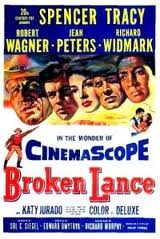
BROKEN LANCE
US, 1954, 96 Minutes, Colour.
Spencer Tracy, Robert Wagner, Jean Peters, Richard Widmark, Katy Jurado, Earl Holliman, Hugh O'Brian, E.G. Marshall.
Directed by Edward Dmytryk.
Broken Lance is a very interesting and enjoyable Western featuring Spencer Tracy. Based on a Phillip Jordan story called House of Strangers and filmed with Edward G. Robinson, the setting of the West is used for a portrait of a family with a tyrannical patriarchal father. There are two sons clashing, Robert Wagner and Richard Widmark. However, the film puts a strong Western setting for this family clash and illustrates many of the themes of the West. Directed by Edward Dmytryk, a director of many well-made and popular features from the 40s to the 70s. Broken Lance was one of the earliest Westerns in Cinemascope and is photographed attractively. Enjoyable and interesting for discussion of the Western heritage and family relationships.
1. Was this a good western? Audience expectations of westerns? How different was this: adult, psychological?
2. The significance and symbolism of the title, its irony, themes, symbolic action at the end?
3. Contribution of colour, locations, stars? The strength of Spencer Tracy?
4. The flashback structure and its success? The focus on Devereux via the picture? Joe's suffering for his father and the explanations?
5. The character of Devereux: his strength as a man, his building up of the ranch. his capacity for work.. his foresight and ambitions? His humiliating his sons and treating them harshly? Favouring Joe? Loving his wife and soft with Barbara? How real and complex a character?
6. The explanation of his arrogance: the shoot? up at the copper mines, his wrong-headedness, stubbornness and impulsiveness, relying on the local law., his reaction to justice? His allowing Joe to suffer for him? The clash with the other sons? The symbolism of his death?
7. How was Matt Devereux a typical man of the American west?
8. Ice: half-Indian background, racist suffering, relationship with his brothers? His loyalty and advice for his father? His love for his mother, for Barbara? His decision to suffer for his father? The impact of the prison, the melodrama of the final fight, breaking the lance, the appropriateness of the happy ending?
9. Ben as oppressed, harsh, suffering, leading his brother. greedy, mad, the inevitability of his death?
10. Denny as a follower, irresponsible? Mike?
11. The contribution of Barbara: the pepper sequence, her love for Joe, waiting for him? The racist theme with her marriage? Her father's friendship with Matt, thinking of his position? Racism?
12. The portrayal of the Indians, their protection of the Devereuxs? The final shooting?
13. Themes of family, love, hate, power, justice, property and the symbolism of the ranch itself, life and death?
14. What did this western achieve?
Published in Movie Reviews
Published in
Movie Reviews
Tagged under
Saturday, 18 September 2021 19:45
Broken Sky
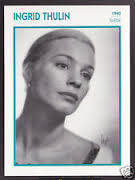
BROKEN SKY
Sweden, 1982, 96 minutes, Colour.
Susanna Kall, Thommy Beggren, Margaretha Krook.
Directed by Ingrid Thulin.
Broken Sky is a moody Swedish World War Two film, focussing on a young 13 year old girl and her experience of a changing world. The film is beautifully photographed, has the atmosphere of the Swedish countryside and its brooding.
The film was written and directed by actress Ingrid Thulin, who worked in so many Bergman films of the '50s and '60s and into the '70s with Cries and Whispers. She made a great number of Hollywood films and filmed internationally, especially in Europe. The film has a very good cast led by Thommy Berggren,
who appeared in Bo Wiederberg's Elvira Madigan and The Ballad of Joe Hill. Accomplished Swedish actress Margarita Krook is one of the grandmothers. It is said that the film is in some ways autobiographical of its writer.
1. The impact of the film as drama? Portrait of a young girl? Her parents? Grandparents? Portrait of a period in Swedish history? A memoir? The insight into Sweden of the '40s from later decades?
2. The contribution of Ingrid Thulin and her experience, writing, directing? Her personal viewpoint in the understanding of Erika?
3. The significance of the title and the location photography, colour? Atmosphere and mood? Musical score?
4. The focus on Erika: her age, experience, isolation? The present, the fight, her anguish? Her relating to her mother? Her love for her father? The two grandmothers and their differing influences? The film's attention to Erika as a person, the details of her life, her relationships, her growth in understanding? Self-awakening in physical growth, sexuality, anger, trust?
5. Her mother and her work, fears? Love, exasperation? Relationship with her husband? Control of the family? Interaction with Erika? The two grandmothers? Leaving?
6. The contrast with the father, his fighting, mods, work, isolation, madness, violence, escape? His love for Erika? The ending?
7. The grandparents: their hard attitudes, explanation of their attitudes, trying to cope, sympathies?
8. The re-creation of the period, the rumours of wars, the past, isolation in wartime, change?
9. Erika and her future?
Published in Movie Reviews
Published in
Movie Reviews
Tagged under